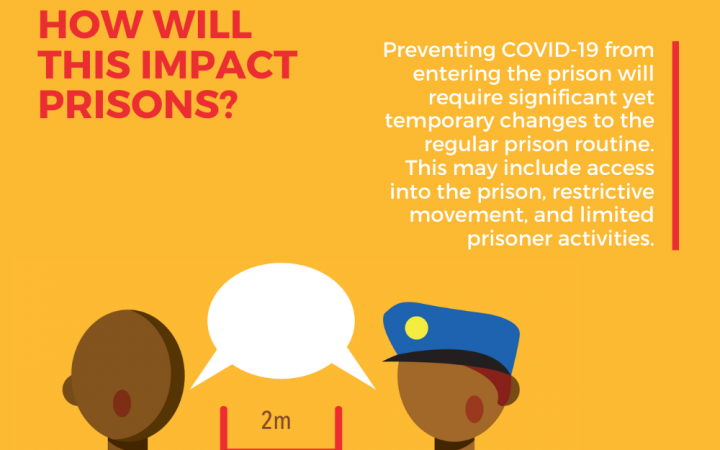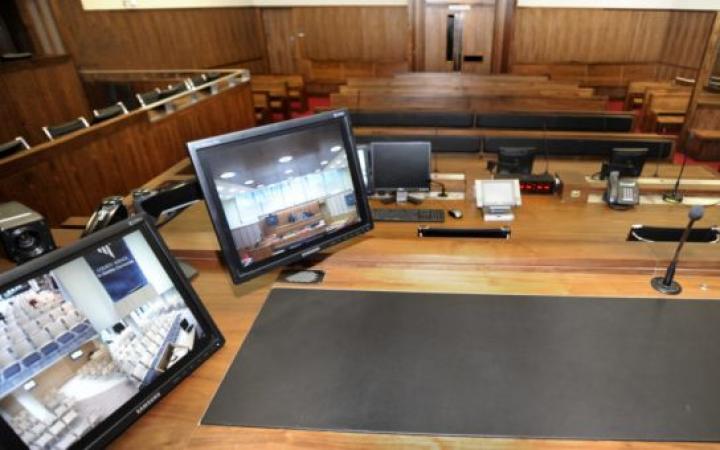This March, UNITAR Division for Peace and the Justice and Corrections Service (JCS) of the Office of Rule of Law and Security Institutions (OROLSI), United Nations Department of Peace Operations (UN DPO), partnered to developed two new operational documents designed to support collective COVID-19 response within the justice, security and corrections sector.
COVID-19 Preparedness and Response in Places of Detention: Operational Toolbox
Responding to the COVID-19 outbreak is particularly challenging in the places of mass confinement, such as prisons, which makes prevention critical. While preventive measures will most likely result in significant disruptions to ordinary prison routines, both staff and prisoners need to be adequately instructed and equipped to take the necessary steps to keep COVID-19 out of prisons.
The information in the COVID-19 Preparedness and Response in Places of Detention: Operational Toolbox (available in English, French, Spanish, Russian, and Arabic) is intended to support prison administrators and staff in their efforts to prevent COVID-19 from entering the prison and mitigate the impact in case of an outbreak, while ensuring the safety, security and well-being of staff, prisoners, their families and the public. The package includes ready to use communication tools (available in Portuguese, Swahili, Somali, Serbian and Albanian in addition to the languages mentioned above) with clear and concise information and visuals.
Over the past months, the Toolbox and the related materials in various languages have been widely used in mission settings, including in the United Nations Mission in Kosovo (UNMIK) and the United Nations Organization Stabilization Mission in the DRC (MONUSCO).
Operational Guidance on the Use of Videoconferencing for Court Proceedings in Mission and Fragile Settings
The pandemic have also impacted the administration of justice in every legal sector and forum around the globe, particularly rendering in-person hearings challenging or impossible. The disruption to conducting hearings and other judicial processes critically implicates access to justice, due process, and civil and human rights.
The new Operational Guidance on the Use of Videoconferencing for Court Proceedings in Mission and Fragile Settings, once again by UNITAR and OROLSI, addresses using video-conferencing and other technologies to conduct remote hearings when in-person hearings are not feasible.
Given the wide variation in settings where hearings are conducted, it is not possible to provide uniform advice about whether and how to use remote hearings. Instead, the Guidance provides a decision-making framework and resources so that each stakeholder can arrive at the appropriate solution for the context.
The vision is that the Operational Guidance will be used by all varieties of legal stakeholders – ministry officials, judges, lawyers, court officials, and others –responsible for the access to and administration of justice in challenging environments. The Toolkit should be considered not only as an immediate response to COVID-19 but also for longer-term planning. The establishment of remote alternatives to court hearings and judicial processes may help improve access to justice in contexts where insecurity, limited transport, logistical and other obstacles will continue to severely hamper the delivery of justice services.
Access and download the COVID-19 Preparedness and Response in Places of Detention: Operational Toolbox and related materials.
The Operational Guidance on the Use of Videoconferencing for Court Proceedings in Mission and Fragile Settings will be published in the coming weeks.
To learn more or for any questions and queries related to the projects, please reach out to us at pdta@unitar.org.




